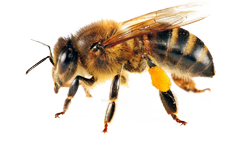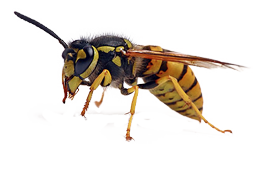Bees
Bee Season:
Spring / SummerIdentifying Bees
 There are 3 main types of bees to identify: Masonry Bees, Honey Bees and Bumble Bees.
There are 3 main types of bees to identify: Masonry Bees, Honey Bees and Bumble Bees.Masonry Bees
Unlike Honey Bees, Masonry Bees are solitary insects and are normally harmless. You can find Masonry Bees living in small excavations made from sand and other particles which are glued together with the bees saliva.Masonry Bees can be a problem due to their nest building behaviours, which involves digging. Especially in older buildings, Masonry Bees can tunnel through soft brick mortar causing instability in the walls. Repeated attacks on the brick work can cause problems over all seasons.
They will also nest in small holes in mortar, which can be present in all houses, not just old ones. The holes should be filled in to avoid bees nesting there. Insecticides can be used if the bees nest has become a problem.
Honey Bees
As the name suggests, Honey Bees produce honey. The honey is used to feed themselves and their larvae. Some Honey Bees live in colonies and some are solitary, some them sting and some don't. Once a Honey Bee has used it's sting, it dies.Honey Bees rarely present a problem, but in large swarms in undesirable places they can. They can tend to nest in chimneys or wall cavities. Once the nest has been killed, efforts must be made to remove it or seal it in. This is because any residual honey or dead grubs left in the nest can attract other bees and insects.
Bumble Bees
Bumblebees live in colonies and consist of the queen bee and her worker bees. The queen bee is very large, and feeds on flowers such as willow catkins, bluebells and lungwort. They can be spotted form February onwards, feeding and searching for potential nest sites.Some species of Honey Bee nest underground whilst other nest above the ground in long grass or leaves. By mid-summer the queen starts laying both male and female eggs. Nests can contain several hundred worker bees. The bees live for one year.
Female Honey Bees are the future queens and leave the nest along with the males to mate. The new queens then bury themselves underground until the following spring. In the Autumn, the males, old queen, and worker bees leave the nest to die.
Bee Treatment
To treat your bee problem quickly and discreetly get in touch.| Mobile. | 07811 319158 |
| Email. | Click to Email |

 Rats & Mice
Rats & Mice 


 Web Design
Web Design